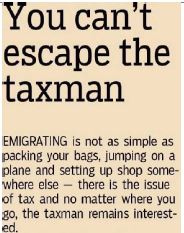South Africans Abroad
Emigrating from South Africa is not as simple as packing up your bags, jumping on a plane and setting up shop somewhere else. Unfortunately, there is still the issue of tax and no matter where you go, the taxman remains interested.
The South African Reserve Bank, SARS and even the globally agreed “common reporting standards” or “CRS” want to know your movements. Even Home Affairs have climbed on this bandwagon in respect of the White Paper released last year which recommends that all South Africans abroad must report themselves correctly, for good recordkeeping and for the authorities to know their whereabouts.
The only way to formally place yourself on record for all these items is to undertake the financial emigration process. This means that you will be noted with SARS (which covers your personal tax status and CRS) and the SARB (which covers your bank account status) that you are no longer “ordinarily resident” in South Africa for fiscal purposes. By doing this, your status means that the South African authorities no longer have a reporting claim on your world-wide income and capital gains.
We Live In A Small World
A worrying factor is that the many South Africans abroad seem to think they can escape SARS, for the mere reason that they are living somewhere else. Whilst the circumstances and reasons for justification vary, from an attorney’s perspective, the following factors are very worrying –
- “My Tax Advisor / Accountant Does My Taxes”. We only take on new clients once, we insist on reviewing the personal tax filing status of the expatriate. More than 75% of cases are non-compliant. This is not new for SARS, as this very reason was noted by SARS in last year’s Parliamentary debate on the 183-and-60-day-test, which will cause much hardship for various segments of our expatriate population.
- “How Will They Know, I Am Small Fry”. The tax system is designed to create a net, which also catches the small fish. And sometimes catching a small fish and making a good example thereof, goes a very far way in making other small fish rediscover their tax morality. The Common Reporting Standards are designed to report foreign bank accounts by South Africans. You can ask your bank nicely to not report you, but they will. This means SARS has you on record and, as the saying goes, “it is not a question of “if” but “when”.
- “I Have Been Audited”. Firstly, there is a general layman confusion between being audited and being verified. Perhaps some tax advisors tell taxpayers they are audited to increase their fees; but as a general rule of thumb – if they have not asked for copies of all your bank statements for the past 3 years, your tax return information has only been verified. Secondly, there is no “prescription period” for auditing undisclosed information in a tax return and also no prohibition against being audited again.
- The single biggest concern, however, is a system which does not forget. The tax system has now reached the point where you are not forgotten, regardless of when you have left South Africa. Taxpayers knocking on our door for help are mostly those who are audited back for many years. It is a criminal offense to not keep records for 5 years from the date of your tax submission, thus technically a 7-year record keeping period. But more telling is that Revenue Authorities are globally working together to share information. Coupled with compulsory reporting by all financial institutions, the foreseeable plan is that tax returns are expected to become a relic, as SARS will already have all the required information from third parties to self-populate your return and send you the bill.
Guilty Until You Prove Yourself Innocent
When I qualified as an attorney, one of the best weapons at my disposal was the concept of “onus of proof”. Where you are not proven to be guilty – beyond reasonable doubt for criminal matters, balance of probabilities for civil litigation – no allegation sticks.
The taxman has, however, long ago found a way around this trick. When it comes to tax compliance, you are guilty until you prove your innocence.
To get around world-wide taxes as an expatriate, the classic defence is that you are not “ordinarily resident” in South Africa. This onus is discharged by undertaking the financial emigration process, which is a SARS and SARB process, whereby you are noted on record as having emigrated. From a tax legal defence strategy, two items are important –
- SARS adjudicates this process and issues an emigration tax clearance certificate. This means you have de facto already passed the onus of proof requirements. Also, it would be against the concept of administrative justice for SARS to later perform an audit on the same facts and come to a different legal conclusion. The key here is that the financial emigration process must be done legally correct and not just as an administrative process, as suggested by quick-and-dirty providers.
- When you are challenged by SARS on tax residency and have not done the financial emigration route, you need to be prepared to answer under cross examination as to why you have decided to not undertake the legal prescribed process. Sometimes the taxpayer notes that they have not done financial emigration as South Africa remains their real and main home, which technically means they remain ordinarily tax resident in South Africa. Relying on tax treaty exemption is one alternative here, but this becomes a rough road, especially as the taxpayer has already conceded by implication that their habitual abode is in South Africa.
Final Solution
Financial emigration provides a final risk management solution for expatriates to not have to declare their world-wide income and capital gains. This also provides a solution to Common Reporting Standards and Exchange Control restrictions.
For those who need convincing to do the correct thing, we suggest they equate this to insurance. You hope to never have to suffer an accident or suffer otherwise damages, but one can never be certain and thus could possibly face financial ruin.
Should you require any assistance, or if you wish to financially emigrate, please complete the contact form below:








